In which the beleaguered reviewer attempts to make some headway into the mounds of CDs seeking reviews accumulating daily by providing quick hits on a few recordings at a time.
UOU - "Home"
 (Tippin Records)
(Tippin Records)
The group UOU consists of five Japanese musicians who had relocated to Boston to attend Berklee music school nearly a decade ago, before settling into NYC's vibrant jazz scene. The title Home refers to situation these young artists find themselves in - living in the United States, while still finding inspiration from their homeland of Japan. Fortunately for us, this cross-cultural commingling has resulted in an impressive debut recording that combines modern American jazz directions with Far Eastern folk melodies. All five members - guitarist Daisuke Abe, reed player Takuji Yamada, pianist Yoko Komori, bassit Kuriko Tsugawa and drummer Yoshifumi Nihonmatsu - contribute two original compositions apiece, and although there is coherent overall direction, this adds a freshness to the recording that is quite appealing. Case in point is the opener "Hanauta" (humming in Japanese) - a sprightly piece by Abe that glides along delightfully and showcases both the guitarist and Yamada on alto saxophone and bass clarinet. The band then moves confidently into Yamada's hauntingly slow-paced waltz "No Mind" and Komori's lovely waltzing "Queen's Dance" - which again features Yamada's graceful bass clarinet, as well as the pianists attractive light touch on the keyboard.
Yamada's "Cat's Play" is an up-tempo straight-ahead number with fine band interaction and solos. Meanwhile, bassist Tsugawa pitches in with the beautiful title track which overflows with nostalgic longing - its Eastern-tinged melody again performed on bass clarinet and guitar with subtle interjections from Komori and a pleasing bass solo. Komori's Latin-inspired, odd-metered "Moldiana" brings another flavor into play and gives drummer Nihonmatsu an opportunity to shine, while Komori's fine solo shows a bit of a Chick Corea influence on this smoldering highlight. Yamada also breaks out the soprano sax on this number - adding yet another hue. Drummer Nihonmatsu also pitches in with two numbers of his own - the elegant and memorable ballad "As I Recall" and album ending "Rock-A-Bye" which combines a rock beat with a lullaby melody and an anthemic alto saxophone solo. Abe and Tsugawa also add "Ofro Song" and "Shoka" respectively which fill this strong first recording out with interesting songs bursting with youthful energy and positive energy. An invigorating and auspices start for this promising ensemble.
www.uoumusic.com/
 Myron Walden - "Countryfied"
Myron Walden - "Countryfied"
(Demi Sound Records)
Saxophonist Myron Walden is a well-known saxophonist on the NYC scene, who won the prestigious Lincoln Center Charlie Parker Award before spending much of the '90s accompanying many of the top performers who played the city's Small's nightclub. He is perhaps best known for his work as a member of Ray Barretto's last band and in Brian Blade's Fellowship Band, and for the four well-received recordings he has released. Born in Miami, the young man later moved to the Bronx. Growing up, he listening to a wide range of music, including Charlie Parker, Gospel, Country, Blues, R&B and Rock n' Roll. On his fifth release as a leader, Countryfied, Walden draws upon all of these influences in a down home quartet setting, with Ron "The Octopus" Osawanski on organ, Israeli-American Oz Noy on guitar and Kenneth Salters on drums joining Walden - who plays entirely on tenor sax on this album.
There is a low-down gritty, Southern-fried feel to these all-original tunes, and while the opening title track is a simmering blues with some rattlesnake guitar by Noy, there is more than a touch of churchiness to "What Will Be Will Be" -- which features Walden's soaring saxophone filled with the spirit. The compelling "I Cain't Do Nomore" should be an R&B hit and some clever singer should add some lyrics to this enjoyable number. The slow waltzing "Through it All" demonstrates Walden's way with a melody and his assured and singular sense of phrasing - his sax "sings" like an Otis Redding or Percy Sledge on this catchy tune. On "Between Us," Jared Gold takes over on organ, while Steven Elliot adds slide guitar on this sensuous and highly-satisfying track. The rest of the album is performed by the original quartet and mixes both exuberant, foot-stomping "good-time" music like "Double Dippin,'" "If It Wasn't For My Pride" and "Happy Feet" (which all exhibit some old time rock and roll influence) and savory slow compositions like the countryfied "Before You" and "I Get So Lonesome Sometimes." In this day of disposable crossover country, one sometimes can forget the strong link that country and Jazz and R&B once had -- something people like Ray Charles explored. Walden has said this album was inspired by Southern roots music, and it truly lives up to its designs - a strong and engaging new album from a unique voice as a saxophonist and composer.
www.myronwalden.com/
Dave Liebman - "As Always"
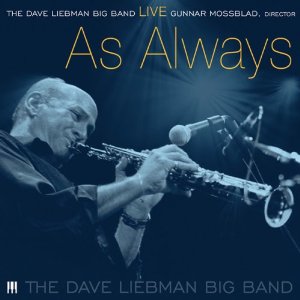 (MAMA Records)
(MAMA Records)
The seemingly omnipresent Mr. Liebman's new album As Always is a a big band outing, with a half dozen of the veteran reedman's songs arranged by five different arrangers. These compositions are played live with authority by Dave and his usual quartet (guitarist Vic Juris, bassist Tony Marino and drummer Marko Marcinko) surrounded by a 14-piece horn ensemble of respected NYC musicians at two different shows in 2005 and 2007. The first-rate group is conducted by Gunnar Mossblad and they fire through a series of interesting arrangements of some of Libeman's exhaustive catalog. "A Bright Piece" - arranged by Andrew Rathburn starts things off on a sprightly pace with a sound that fits its title well and an almost unbelievable solo from the guest of honor. Of course, Liebman is the primary soloist and his playing on the soprano sax is central to the overall sound and he continues to play his Post-Coltrane-style lines at a very high level. Pete McGuinness takes on the title track and takes it into a lush and romantic track filled with vibrant colors and more stunning work from Liebman -- a fine player who perhaps has been more overlooked than he should for the notion that his work is heady. This recording should help dissuade this notion and his masterful work on the often-abused soprano sax should be more recognized.
A true highlight is the more than 14-minute mysterious "Anubis" - with Liebman opening the piece on wooden flute before switching over to soprano to duel with Charles Pillow's oboe and Chris Karlic''s bass clarinet on this Middle-Eastern influenced number. Juris plays some delicious angled guitar, while Jim Ridl further disjoints the atmosphere with his wobbly synthesizer solo, on this piece which reminds of some of Miles' moody '70s forays, but with big band breaks. The incendiary "New Breed" (like the previous song - arranged by Scott Reeves) is a tune Liebman wrote for Elvin Jones that features some of Liebman's strangest work, while the superb "Philippe Under the Green Bridge" approaches the modern chamber music of Schoenberg and Messiaen before evolving into jazz directions that build to an intense climax with complex horn charts in a stunning arrangement from Mossblad that is another highlight of this recording. Marcinko and Juris get an opportunity to take solo spots on the freewheeling "Turn it Around" (arranged by Guri Agmon) that ends the album with some blistering fast soprano runs. Liebman has received numerous honors recently, including the Order of Arts and Letters medal from the French Ministry of Culture and Comunication and the 2011 National Endowment of the Arts Jazz Master Award; this album is a fine addition to an already highly successful year.
www.mamarecords.com/
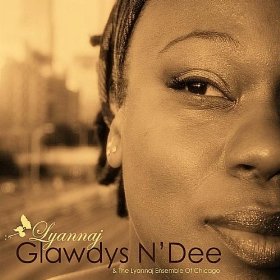 Glawdys N' Dee - "Lyannaj"
Glawdys N' Dee - "Lyannaj"
(Afromondo Productions)
Singer Gladys N'Dee was born in Guadeloupe, the French Carribean island - she became a featured singer in churches around the island at an early age. later she moved to France and joined the gospel group "Difference" and began singing more blues - often with visiting American artists - some from Chicago, where she eventually settled. Her debut album - Lyannaj (A Creole word meaning coming together in unity) is an exciting mixture of Afro-Caribean, West African, jazz and soulful pop flavors presented in a well-produced and attractive manner. N'Dee has been compared to Nina Simone and her powerful vibrato-infused voice can produce a rough edge and simmering anger at injustice that is comparable to the great Simone, as on the powerhouse "Goree" - written about the island where slaves were held before being sent from Africa. But N'Dee can also be very melodic and she sings in multiple languages, while also layering her backing vocals in lush and colorful harmonies.
Backed by an outstanding cast of musicians, including pianist Darwin Noguera (CALJE), bassist Victor Miranda (Al DiMeola), trombonist Bill McFarland (Chicago Horns), Larry Gray (on cello!), keyboardist "Koko" Brunson, guitarist Herb Walker and violinist James Sanders among many others, N'Dee's songs are colorful and compelling and with 16 tracks there is plenty to choose from. Beautiful songs like the island breezing "Soley" and pop hit "The Time has Come" (complete with fine rap interjection by Lucky) will capture your heart, while numbers like may stir your anger. Meanwhile, mention must be given to saxophonist Fred Jackson for his wonderful work on soprano sax. Other tracks include the reggae-ish "Jerusalem," Latin-smooth "Chicago Kaladja," African "Mesi Manman," the Sade-ish "All Over Again" (another highlight), the uptempo "Manman Africa" - with killer bass from the talented Miranda and the ending African choir number 'Hommage A La Noire" - which pays tribute to black women. N'Dee has hit upon a winning combination here by combining her strong voice with multicultural styles and a positive uplifting message that the listener will enjoy hearing often, and hopefully this recording will bring her some of the attention she deserves.
www.gladys.net
Brad Goode - "Tight Like This"
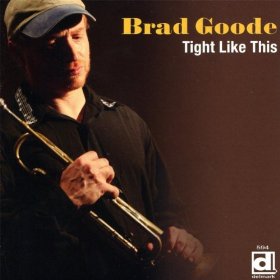 (Delmark Records)In the liner notes to his new album, Tight Like This, trumpeter Brad Goode tells an amusing story of how when he was young he was given two fake books and a Louis Armstrong Greatest Hits album and how that gift really set him on his path. To pay tribute to the great older players like Armstrong who shaped his art, Goode has included several of these dusty old selections on the album, but don't think you are going to hear the old arrangements, Goode and his band have jazzed up thes eold tunes with some hip modern new directions. With a strong rhythm section of bassist Kelly Sill and drummer Anthony Lee providing the rhythm support, Goode and pianist Adrean Farrugia are freed up to explore exciting new directions on songs like the title track (written for Armstrong by A. Curl) and Walter Donaldson's piece written for Bix Beiderbecke - "Changes" where the two primary soloists take the old standard melody into some delicious avant garde directions, while still maintaining listenability. On Xavier Cugat's sultry "Nightingale," Goode pulls out the mute on a moody, fairly straight-ahead, but quite satisfying version with a nice bass solo from the talented Sill. A fairly straight-ahead version of Irving Berlin's "Reaching for the Moon" and a funky take on Freddie Webster's "Reverse the Charges" follow before the second half of the recording is filled with mostly originals penned by Goode, and he shows a nice way with composition on these interesting numbers. "Summary" is an energetic waltz with great spiraling piano solo from Farrugia, while "Midwestern Autumn" is a melancholy ballad with velvety muted horn caressing the fragile melody. "Climbing Out" is twisting number with some of the best band interplay on the recording, while "The River" boasts a strong and memorable melody. "Bob's Bounce" (for Delmark founder Bob Koester) is a high-stepping mainstream track with Goode displaying his impeccable chops, while the album ends with a shimmering yet rhythmically undulating version of "Softly, As in a Morning Sunrise" (arranged by Faarugia). A true blending of the old and classic with the new and inventive, Tight Like This is an appealing and robust addition to Goode's catalog, with a tantalizing amalgam of strong songs and arrangements, acute band interplay and adventurous and highly proficient solos that will tickle most jazz listeners.
(Delmark Records)In the liner notes to his new album, Tight Like This, trumpeter Brad Goode tells an amusing story of how when he was young he was given two fake books and a Louis Armstrong Greatest Hits album and how that gift really set him on his path. To pay tribute to the great older players like Armstrong who shaped his art, Goode has included several of these dusty old selections on the album, but don't think you are going to hear the old arrangements, Goode and his band have jazzed up thes eold tunes with some hip modern new directions. With a strong rhythm section of bassist Kelly Sill and drummer Anthony Lee providing the rhythm support, Goode and pianist Adrean Farrugia are freed up to explore exciting new directions on songs like the title track (written for Armstrong by A. Curl) and Walter Donaldson's piece written for Bix Beiderbecke - "Changes" where the two primary soloists take the old standard melody into some delicious avant garde directions, while still maintaining listenability. On Xavier Cugat's sultry "Nightingale," Goode pulls out the mute on a moody, fairly straight-ahead, but quite satisfying version with a nice bass solo from the talented Sill. A fairly straight-ahead version of Irving Berlin's "Reaching for the Moon" and a funky take on Freddie Webster's "Reverse the Charges" follow before the second half of the recording is filled with mostly originals penned by Goode, and he shows a nice way with composition on these interesting numbers. "Summary" is an energetic waltz with great spiraling piano solo from Farrugia, while "Midwestern Autumn" is a melancholy ballad with velvety muted horn caressing the fragile melody. "Climbing Out" is twisting number with some of the best band interplay on the recording, while "The River" boasts a strong and memorable melody. "Bob's Bounce" (for Delmark founder Bob Koester) is a high-stepping mainstream track with Goode displaying his impeccable chops, while the album ends with a shimmering yet rhythmically undulating version of "Softly, As in a Morning Sunrise" (arranged by Faarugia). A true blending of the old and classic with the new and inventive, Tight Like This is an appealing and robust addition to Goode's catalog, with a tantalizing amalgam of strong songs and arrangements, acute band interplay and adventurous and highly proficient solos that will tickle most jazz listeners.
www.delmark.com/
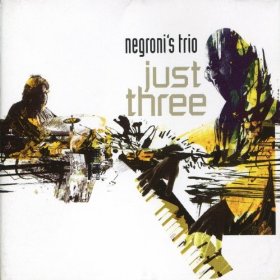 Negroni's Trio - "Just Three"
Negroni's Trio - "Just Three"
(Mojito Records)
The father and son team of pianist Jose Negroni and his son drummer Nomar -- along with a rotating cast of bassists has been winning acclaim and Grammy nominations for their original direction as a Latin trio. Bassist Marco Panascia is the guest on bass this time out and he seems like an appropriate fit for the sound with his rich, woody tone and aggressive approach. Meanwhile, father and son Negroni play together like they are one instrument they are linked so closely. As on the opening "Fingers," Jose often switches over from acoustic piano to electric within the context of the song for some fun licks and additional colors. The second number is the killer "Emotions" whose jumping rhythms highlight the band on perhaps the album's strongest track. Blending together a punchy Latin rhythmic attack with Jose's creative keyboard approach. Tunes like "Bailando Rumba" and "Milani" are hard to keep still to, but at the same time feature frequent and sudden changes in cadence that will pleasantly surprise the listener. Things don't slow down until the title track with Panascia's creamy arco bass (and a superb pizzicato solo), but even here things don't stay quiet for long. Tracks "Golden Man" and "Mi Triguena" are more variations on the familiar Negroni format, but "Pleludio en la Noche" presents Jose in a stunning 8:02 solo piano exhibition of the veteran pianist's exceptional classical, jazz and improvisational prowess. This is followed by a full band version of the same piece in which Panascia and especially Negroni the younger interpolate their own conceptions into the composition - ending this enjoyable album on a dynamic note.
www.negronistrio.com
Patrick Cornelius - "Fierce"
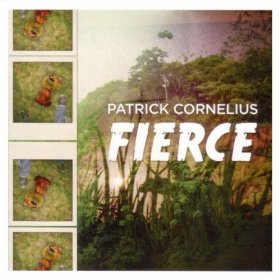 (Whirlwind Recordings)
(Whirlwind Recordings)
The saxophone-led chordless trio concept has been used before with people like Joshua Redman and Donny McCaslin achieving some level of success. Alto saxophonist Patrick Cornelius leads a trio consisting of bassist Michael Janisch and drummer Jonathan Blake - both of them in-demand players on the New York City scene. But Cornelius also brings in valve trombone player Nick Nayenas and tenor saxophonist Mark Small to ocasasionally break things up - a nice touch. The album starts off boldly with the title track, which is fierce, but not shrill. The high level of the musicianship takes the music to an even higher level with the talented Janisch providing nice melodic counterpoint to Cornelius while combining with Blake to keep the trio moving forward. Although "Fierce" and "Hopscotch" are somewhat intense, the band slows it down pleasantly on the engaging "Maybe Steps." Although Cornelius' sax is the primary soloist and he is a creative and highly technical player, his playing is always tasteful and he never oversteps into self-indulgence. Nayenas' trombone combines well with Cornelius' alto and they both rip into solos on "Two-Seventy-Eight," but the spotlight belongs to Blake - who takes an incendiary drum solo. Meanwhile, Small's tenor adds additional colors on the straight-ahead "First Dance." Other strong tracks include the Latin-flavored "The Incident," the slow trio ballad "Home With You," the free-wheeling "One Thing (Leads to Another)" and the fabulous album-ending "New Blues" -- which seems less a blues than an uptempo track with some of the best band interaction on the record.
www.patrickcornelius.com/
 Lindsey Horner - "Undiscovered Country"
Lindsey Horner - "Undiscovered Country"
(Artist Share)
Bassist Horner - a veteran of stints with Bill Frisell, Myra Melford, Greg Osby and Phillip Catherine, has produced an album of uncommon beauty while merging jazz with Irish music on Undiscovered Country. The spirited title track immediately sets the tone with vigorous bass and drums (by Allison Miller), Horner adding baritone sax, Celtic style fiddle by violinist Rob Thomas and a blazing electric guitar solo by Colter Harper. The lovely Irish ballad "In the Garden" follows and sung by Ireland's Andy Irvine who also adds wonderful mandola and harmonica. An African direction is taken on the marimba-driven "All That Seems to Be, Is Not/ All That Seems Not Be, Is" which showcases Rob Thomas' violin along with Erwin Vann on tenor saxophone, Jeff Berman on marimba and Harper again on guitar on this epic centerpiece. The peaceful "Paradise Touch" offers the multi-talented Horner on Bb whistle and bass clarinet (as well as bass), a sultry tenor solo by Vann and a plethora of exotic percussion (including frame drum and bodhran) played by Bermann and Randy Crafton. Guitarist Augustin Foley takes the solo here and comes up with a darker shade that suits the song well. This mingling of different sounds and styles makes for a colorful new country indeed. Irvine returns on a 7/8 reworking of an old Scottish ballad -- "John Barlow" with Berman adding mountain dulcimer to this delightful track. Almost unexpectedly the band shifts into a bluesy/funky number ("I Like it Because I Like It") - which is stretched out to allow for several solos.The breezy West-African-influenced "Low Life" ends the album on a joyous note with Horner adding tanpura and harmonium to this marimba-infused number. For those who think there is no music left to discover, Horner and his friends have created an exciting new country of sound to explore for our latter day musical Magellans.
www.lindseyhorner.com
Michael William Gilbert - "I Can See From Here"
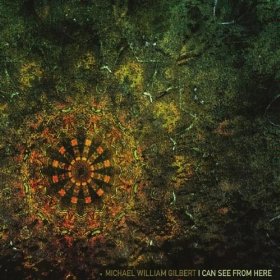 (Gibex Recordings)
(Gibex Recordings)
One can dispute the place of electronics in jazz music, but what is clear is that composer Michael William Gilbert has found a place where technology meets the heart. Gilbert's work is an effective fusion of the synthetic sounds and natural samples in songs that commingle African and Asian world music, jazz, and electronica into an intriguing musical journey. Although there is at times a feel of otherworldliness, this is electronic music that maintains its humanity quite well. Songs are generally in the five to seven minute range, but are bridged by short interludes; all are quite effective, although I suspect listeners may initially key in on songs like "Eyeless in Gaza" - with its sampled voices and electric guitar, flowing synths, marimbas and percussion. "Sometimes I See the Sky" features sampled bass lines and vibes in a number that recalls Weather Report, while the marimba/trumpet-led "Dance Myself to Sleep" may be the most catchy track - and one with many subtleties and complex permutations. The album is graced by the contributions of guest Bay-area electric guitarist Peter Kaukonen on the superb "Amerikan Dream." Gilbert's interesting new album should open some eyes as to the possibilities inherent in electronic music.
www.mwgilbert.com/
 Jan Garbarek The Hilliard Ensemble - "Officium Novum"
Jan Garbarek The Hilliard Ensemble - "Officium Novum"
(ECM)
When in 1994, ECM put out a record of Gregorian Chants over which ECM stalwart Jan Garbarek added saxophone (Officium), some detractors found the mixture of the sacred music with free form jazz to be nearly sacreligious. However, the recording went on to become one of the most popular and best selling albums in the ECM catalog. The double album Mnemosyne followed in 1998 and expanded the group's scope to include more world music and modern works. This time around, Garbarek and the vocal group (David James: countertenor; Rogers Covey-Crump: tenor; Steven Harrold: tenor; Gordon Jones baritone) turn their direction eastward and focus primarily on Armenian sacred music adapted by Komitas Vardapet. Recorded once again at the wondrously resplendent Propstei St. Gerold in Austria, the group also opens up for the first time to include two of Garbarek's original songs including the album-closing "We Are the Stars." Other highlights include 13th Century French composer Perotin's "Most Holy Mother of God" (reworked from Mnemosyne) and modern Estonian classical composer Arvo Part's 'Most Holy Mother of God." Part - whose work is heavily influenced by Gregorian chant is the perfect composer for this group - and this excellent piece was composed specifically for the Hilliard Ensemble in 2003. Combining the free-floating saxophone of Garbarek with the voices of the Ensemble was a brilliant conception and it is a pleasure to hear the group continuing to explore new directions on this spiritually-charged release.
www.ecmrecords.com
Bossa Brasil and Mauricio de Souza Group - "Here, There"
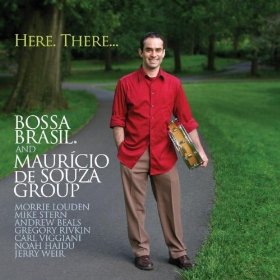 (Pulsa Music)
(Pulsa Music)
Brasilia-born drummer Mauricio de Souza is mainstay on the NYC jazz scene as a busy sideman playing both jazz and Brazilian music while also leading two bands of his own. On his new album de Souza cleverly splits the album between both bands, while also playing both genres. The first six songs are Brazilian covers by artists such as Tom Jobim, Hermeto Pascoali, Baden Powell and Milton Nasimento, performed by de Souza's Bossa Brasil group. Meanwhile, the second half are mostly jazz standards by Joe Henderson, Vernon Duke, Chick Corea and Cedar Walton, with one original (the title track) by the drummer bridging the halves. Making matters a bit easier is the fact that the same players play in both configurations, in settings ranging from trio to sextet, with only de Souza and the amazing Morrie Louden on bass appearing on every track. The sprightly "Bebe" starts things off with an interesting quartet of piano (Carl Viggiani) and vibes (Jerry Weir) joing de Souza and Louden. Meanwhile, the waltzing "Chovendo na Roseira" offers up the first of several excellent bass solos by the underrated Louden. The always amazing Mike Stern guests on "Vera Cruz" adding some fusion guitar, while in yet another twist Andrew Beals and Gregory Rivkin add alto sax and trumpet respectively to the vibes-driven "Imagem" (another great Louden solo here as well). Meanwhile Baden Powell's 'Consolacao" is a highlight with energetic trio interplay between de Souza, Louden and Viggiani and a colorful solo from de Souza. The second half's movement into more standard jazz fare (albeit with interesting arrangements that include further rhyhmic adventures) begins with the vibes-drenched title track, before Stern returns to launch into some incdnairy riffs on a memorable version of Henderson's "Inner Urge" (another killer Louden solo! I can't say enough about the talented bassist). "I Can't Get Started" is a sultry showcase for Rivkin's trumpet and Beals' alto over the piano/vibes combo that started things off, while Corea's "Windows" drops the vibes. The album ends with version of Cedar Walton's "Firm Roots" on which Rivkin sits out. An engaging and enjoyable demostration of de Souza's ability to exist both here and there in both the Brazilian and straight-ahead jazz worlds.
www.mauriciosouzajazz.com/
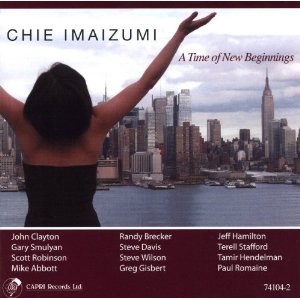 Chie Imaizumi - "A Time of New Beginnings"
Chie Imaizumi - "A Time of New Beginnings"
(Capri Records LTD)
Japanese-American composer Chie Imaizumi believes in taking a positive approach to her writing and it shows clearly on her sophomore effort A Time of New Beginnings. Imaizumi - a former award-winning organist in her native Japan, switched her focus primarily to composition while attending Berklee. Releasing the acclaimed Unfailing Kindness in 2007, she also was named a "Rising Star Composer" by Downbeat that year. The lineup on this big band recording - includng trumpeter Randy Brecker, bassist John Clayton, reed man Steve Wilson, bari sax player Gary Smulyan, trombonist Steve Davis and trumpeter Terrell Stafford speaks volumes as to the reputation she has built. The album opens with the bright and cheerful "My Heartfelt Gratitude" which features bouyant piano by Tamir Handelman and pleasing soprano sax by Wilson. Brecker only appears on "Information Overload," but he makes the most of the opportunity -- producing a well-conceived solo that complements the ever-shifting rhythms and distorted electric guitar by Mike Abbott. Handelman's acoustic piano centers the somewhat sad "Fear of the Unknown," with Clayton initially bowing his bass before taking a solo, but the mood of the song retains a sense of hope and never reaches despair. The title track moves beyond the sadness into a Latin-flavored mode with great ensemble work that seems to exhibit the feeling of determination (see Jeff Hamilton's hardcharging drums).
"Run for Your Life" almost recalls circus music or 1960's soundtrack music (with explosive drumming from Hamilton again), while the lovely little "Today" features lilting counterpoint on a folksy guitar piece. "Sharing the Freedom" was written on commission for the U.S. Air Force and features nice alto saxophone from Wilson and Clayton on surprisingly funky bass on a piece that builds to a bright and joyous climax. "Many Happy Days Ahead" is a truly beautiful composition that seems to really sum up both Imaizumi's attitude as well as her future (Davis and Smulyan get solo spots here), while the album ends with the playful "Fun and Stupid Song" (which is fun, but anything but stupid) with a killer solo by Scott Robinson (he switches from sopranino to tenor sax somehow within the solo!) and a drum battle between Hamilton and Pete Romaine. Imaizumi is an up-and-coming composer whose positive musical attitude is addictive: this is fresh and entertaining music to raise your cheer with and to help you get through the dark times.
www.caprirecords.com
Sam Fazio - "The Songs We Love"
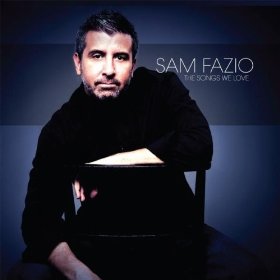
A singer with a clean, warm voice and attractive delivery, Sam Fazio is not your usual jazz singer, as he blends the type of voice that would sound good on Broadway with an overt Sinatra influence in what is a winning combination. Opening with the underrated Oscar Levant/Edward Heyman song "Blame it on My Youth" is a very nice touch -- and Fazio really sells this song effectively touching the heart of the listener by wrenching the meaning out of the lyrics. Mostly well-chosen standards follow, like "The Way You Look Tonight" which is rendered in a delightfully Sinatra-esque manner (he also covers the Sinatra mainstay "Summer Wind" as well as "Beyond the Sea") that will have you snapping your fingers along. Other standards covered include a Tony Bennett-flavored "Fly Me to the Moon," "Georgia on My Mind," the delighful mambo "Sway" (a hit for Dean Martin), and "It Had to Be You," all of which are presented in an appealing way with fine support from pianist Chris White, bassist Nick Schneider and drummer Bob Rummage. But Fazio isn't afraid to take on pop music fare and he succeeds greatly with a jazz/cabaret arrangement of the country hit "Always on My Mind" - a hit for Willie Nelson, but not a song I've really ever cared much for, until now. Although his voice perhaps doesn't have the gravity of Nelson's worn-leather voice (whose does?), Fazio's appealing timbre still is highly effective and White adds some intriguing chiming elements on the piano on a version that has charmed me. Other modern pop tunes covered include Cyndi Lauper's "Time After Time" (also covered famously by Miles Davis), and two tracks from Van Morrison ("Moondance," "Have I Told You Lately That I Love You"). Although Fazio may receive some criticism for sounding too much like "Old Blue Eyes" at times, there are worse singers to emulate, and I guarantee that you will find yourself singing along with the songs we love on this enjoyable album.
www.samfaziomusic.com
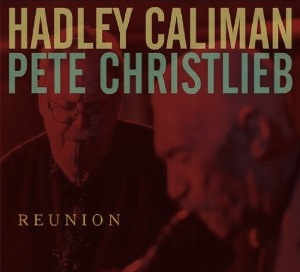 Hadley Caliman Pete Christlieb - "Reunion"
Hadley Caliman Pete Christlieb - "Reunion"
(Origin Records)
Tenor saxophone veterans Hadley Caliman and Pete Christlieb first worked together in the mid-'60s at Marty's nightclub in L.A. Caliman was fresh out of jail (for drugs) and Christlieb was the brash skinny white kid who filled in when Herman Riley was out of town. Caliman went on to playing with Carlos Santana before becoming a college music instructor near Seattle for several decades. He recently (since retirement) has enjoyed a renaissance - releasing two very well-regarded albums (2008's Gratitude and Straight Ahead from earlier this year - see our review here - which have brought him considerable recognition and acclaim. Christlieb became an in-demand L.A. session musician and big band stalwart (including Doc Severinsen's Tonight Show Orchestra for 20 years). Aside from one gig at a festival in Portland, these two had not performed together in 40 years before this session. Things start off strongly on pianist Bill Anschell's "Little Dex" (after Caliman's nickname Little Dex - as in Dexter Gordon) - which functions as a blowing session with two old friends. The contrasts between styles makes for great listening - Christlieb has the perfect technique and smooth tone gained from years in the business, while Little Dex has the emotion and grainier texture and human feel. Of course, the composer makes a fine statement on his instrument, as does bassist Chuck Deardorf (hard working drummer John Bishop completes the quintet), and the band does great work throughout, on what is essentially a session to highlight the tenor masters. And how wonderful it is to hear these two players light up Freddie Hubbard's "Up Jumped Spring." Caliman and Christlieb both contribute two numbers each, Anschell adds another and they also cover two standards (a sublime take on "I Thought About You" and a ripping version of Cole Porter's "Love For Sale") on this well-balanced recording. Perhaps the centerpiece of the album is Caliman's 11:03 "Gala" with its impressive band interaction, and Christlieb's burning hot "Nasty Green" is high-stepping fun, but I hate to single out any single song because they are all so good. However, I will say the back-and-forth between these two old friends on the album-ending Porter tune is so good, you won't want the fun to ever end. Fans of excellent straight-ahead jazz will want to pick up a copy of this exceptional reunion release from Origin Records.
www.origin-records.com/
The Glenious Inner Planet
 (Blue Bamboo Music )
(Blue Bamboo Music )
You don't hear many bands cover Dave Brubeck's gnarly "Blue Rondo a la Turk," (the variation here is titled "Blue Rondo a la Raad") but that's the case on bassist Glen Ackerman's new album The Glenious Inner Planet. Of course, I don't remember an electric guitar solo (courtesy the talented Chris Cortez) occuring on the original either, but in any case it is good clean fun featuring great solo work from Woody Witt on soprano sax and Ackerman, while setting the tone for what is an enjoyably wild ride. Things get Miles funky on the humorously-titled "There is a Drop of Roppongi on My Shorts" with Ted Wenglinski on hyper-panned electric piano, Paul Chester on guitar, Joel Fulgham on drums and Ackerman on a supersonic solo that is a thing of wonder. It is clear that Ackerman has listened to bass and drum units like Future Sound of London on "Inner Planet" with JD Guzman on drums, space age electronic keyboard effects and Witt's soprano dueling Chester's guitar. Meanwhile, the 9:22 moody, Middle-Eastern-influenced "Khalil" finds the multi-talented Witt on clarinet. "Potato Wagon" is a fun, swinging tune, while "...This Lontano, I" shimmers like a setting sun on a distant horizon. The oddly-titled "The Thing and the Thing that makes the Thing the Thing" is maybe the most interesting and satisfying composition on the album, while "4 is a Feeling" is a burning rave-up that gives the entire gang a chance to tear it up. And album ending "The Angel of the Odd" brings back the space sounds (including Ackerman's wah bass) in a twisted take on the blues. Even though they clearly have lots of fun on this album, it is also apparent that the level of musicianship and composition is serious indeed. Recommended for people who like to smile while they listen to good music.
www.bluebamboomusic.com
